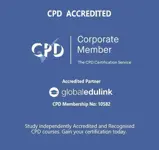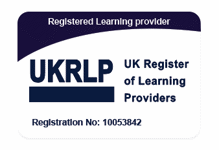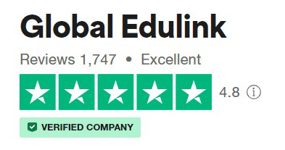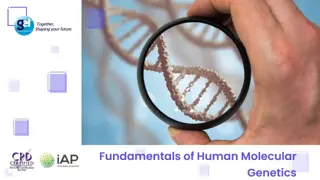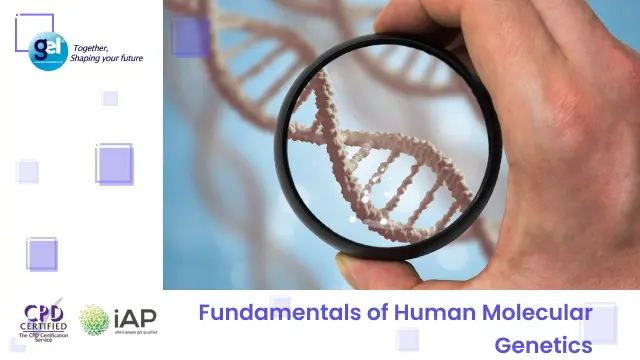
Fundamentals of Human Molecular Genetics
Accredited by CPD & iAP | FREE PDF Certificate Included | Unlimited Access for 365 Days | Quality Study Materials
Global Edulink
Summary
- Exam(s) / assessment(s) is included in price
- Tutor is available to students
Add to basket or enquire
Overview
Fundamentals of Human Molecular Genetics
Since we’ve been able to sequence the entire human genome, there has been a huge shift in the science of human genetics. There is now a wealth of resources which can be harnessed by researchers to identify certain genetic variants that influence our health. This Fundamentals of Human Molecular Genetics course (USA Standards) will eventually help us to understand the underlying molecular pathology of a whole host of diseases that we don’t understand at the moment. In the future, we will be able to use treatments and prevention strategies, and you could be a part of the future of this course.
Learning with Global Edulink has many advantages. The course material is delivered straight to you and can be adapted to fit in with your lifestyle. It is created by experts within the industry, meaning you are receiving accurate information, which is up-to-date and easy to understand.
This course is comprised of professionally narrated e-Learning modules, interactive quizzes, tests and exams. All delivered through a system that you will have access to 24 hours a day, 7 days a week for 365 days (12 months). An effective support service and study materials will build your confidence to secure your qualification.
Please Note: This Course is Based on USA Standards.
CPD
Course media
Description
This online training course is comprehensive and designed to cover the topics listed under the curriculum.
COURSE CURRICULUM
Module 01: What are the Molecular and Chromosomal Basis of Inheritance?
- DNA- chemical structure of nucleic acids and phosphodiester bonds
- DNA- Complementary Base Pairing
- DNA- Double Helix Structure and Hereditary Molecules
- Difference between RNA & DNA & type of RNA
- What is DNA Replication
- How Helicase Unwinds the DNA Double Helix
- How DNA Polymerases and RNA primase Initiate DNA Replication
- DNA Replication: the leading strand and DNA Polymerase Activities
- DNA Replication: Review of Enzymes, Replication Bubbles & Leading and Lagging Strands
- Protein Synthesis in the Cell and Central Dogma
- Transcription of messenger RNA (mRNA) from DNA
- Regulation of Gene Expression: Transcriptional Repression and Induction
- How an Operon Controls Transcription in Prokaryotic Cell
- RNA Processing In a Eukaryotic Cell: Splicing Of Introns & Exons
- Making Sense of the Genetic Code: Codon Recognition
- Codon Recognition: How tRNA & Anticodons Interpret the Genetic Code
- The Role of Ribosomes and Peptide Bonds in Genetic Translation
- Proteins IV: Primary, Secondary, Tertiary & Quaternary Structure
- Translation of mRNA to Protein: Initiation, Elongation & Termination Steps
- Post Translational Modifications of Proteins
- The Chrome Theory of Inheritance: Segregation & Independent Assortment
- Physical Features of Chromosomes
- Mitosis: The Mitotic Splendle
- Mitosis: Phases of Chromosome Segregation
- Cytokinesis
- Asexual Vs. Sexual Reproduction
- Overview of Meiosis?
- Meiosis I
- Meiosis II
- Nondisjunction & Aneuploidy
Module 02: What are Transmission Mendelian Genetics?
- Overview of Genetics
- Properties of Allele
- Mendel’s First Law: The Law Of Segregation
- Application of Mendel’s First Law
- Mendel’s Second Law: The Law Of Independent Assortment
- Application of Mendel’s Second Law
- Condominance & Incomplete Dominance
- Sex-Linked & Sex-Limited Traits
- Chromosome Linkage & Crossing Over
- Complementation Test: Alleles, Crosses & Loci
- Epistasis: Definition and Example
- Lethal Alleles
- The Chi-Square Test
- Polygenic Traits: Definition & Example
- Genotype-Environment Interaction & Phenotypic Plasticity
- The Broad Sense Heritability Equation
- Using Twin Studies to Determine Heritability
- Genomic Imprinting: Definition and Example
- Prader-Willi & Angel Man Syndrome
Module 03: Identifying Population Genetics and Evaluation
- Theory of Evolution
- Hardy-Weinberg Equilibrium II: Overview
- Hardy-Weinberg Equilibrium II: The Equation
- Hardy-Weinberg Equilibrium II: Evolutionary Agents
- Inbreeding: Definition and Effects
- How to Calculate the Coefficient of Inbreeding
- Natural Selection & Adaptation
- Types of Natural Selection
- Genetic Fitness: Selection
- Allopatric & Sympatric Speciation
- Post Zygotic Barriers
- Non- Vertebrate Model Organisms in Genetic Research
Module 04: Developmental Genetics and Model Organisms
- Non- Vertebrate Model Organisms in Genetic Research
- Vertebrate Model Organisms in Genetic Research
- Drosophila Development: Pattern Formatting Of the Body Plan
- How Maternal-Effect Genes Control Early Drosophila Development
- Segmentation Genes in Drosophila Development: Pair Rule, Segment Polarity & Gap Genes
- Role of Homeotic Genes in Drosophila Development
- How Sex Is Determined In Drosophila
- Early Embryonic Development
- Embryonic & Adult Stem Cell: Uses, Origins & Properties
- Knockout Mice: Steps and Uses
Module 05: Identifying DNA Damage, Mutation, and Repair
- How Point Mutations, Insertion & Deletions Affect DNA
- Effects of Mutations on Proteins Functions: Missense, Nonsense & Silent Mutations
- Effects of Frame Shift Mutations
- Mutagens: How the Environment Affects Mutations Rates
- Causes of Mutation and DNA Damage – Mutagens
- Causes of Mutation and DNA Damage – Irradiation
- DNA Mismatch Repair: Correcting Errors That Happened During DNA Replication
- Reversing DNA Damage Caused By Mutagens and Irradiations
- DNA Repair: Fixing Double-Strand Breaks
Module 06: Discovering Human Genetics
- Human Genetic Research Method
- Pedigrees Analysis in Human Genetics: Tutorial
- Pedigree Analysis in Human Genetics: Inheritance Patterns
- Genetic Disorders: Penetrance & Phenotypic Variability
- Tay - Sachs disease: Symptoms & Genetic Cause
- Haplosufficient Genes & Inheritance Patterns of Lethal Alleles
- What Is Haemophilia? Symptoms, Genetic Cause & Treatment
- What Is Huntington’s disease?
- Tumor Suppressor Genes: Retinoblastoma Features, Genetic Cause & Treatment
- Cancer Syndromes & Genetics Risk Factors for Cancer
- Sex Determination, X-Inactivation & Barr Bodies
- Turner Syndrome & Trisomy X: Types of Sex Chromosome Aneuploidy
- Klinefelter & XYY Syndrome: Types of Sex Chromosome Aneuploidy
- How Prenatal and Postnatal Genetic Testing Works
- Why Heart Disease is a Complex Human Disease
- Gametes: Definition, Formation & Fusion
- Genetic Drift: Definition, Examples & Types
Module 07: Definition of Comparative Genomics
- Comparative Genomics: Prokaryotes vs. Eukaryotes
- Comparative Genomic: Homology
- Comparative Genomic: Chromosome Number
Module 08: Explore DNA Technology and Transgenic Organisms
- What is Genetic Engineering?
- What is DNA Plasmid? Importance to Genetic Engineering
- Restriction Enzymes: Function & Definition
- How Ligase is used to Engineer Recombinant DNA
- PCR: Reagents Used In Polymerase Chain Reaction
- PCR: Steps Involved In Polymerase Chain Reaction
- The Sanger Method of DNA Sequencing
- DNA Sequencing & Human Genome
- Microarrays: Definition & Analysing Genes on a Chip
- RNAi: how siRNA molecules inhibit mRNAs
- GMOs: Improving Nutrition Golden Rice
- GMOS: Growing Herbicide-Resistant Crops
- GMOS: Producing Infection-Resistant Cows
Benefits you will gain:
- High-quality e-learning study materials and mock exams.
- Tutorials/materials from the industry leading experts.
- 24/7 Access to the Learning Portal.
- Recognised Accredited Qualification.
- Excellent customer service and administrative support.
The method of Assessment:
At the end of the course, learners will also take an online multiple choice questions assessment test. This online multiple choice questions test is marked automatically so you will receive an instant grade and know whether you have passed the course.
Certification:
Having completed this course, you will be awarded the Fundamentals of Human Molecular Genetics by Global Edulink as well as a summary of the units learnt. This summary will include the specifics of the units you have learnt in the completed course. At the end of this course, you will be able to gain a professional qualification. Potential employers will view you as an asset and will recognize the level of commitment and skills you have displayed while studying this course.
Who is this course for?
This course would be ideal for anyone who hopes to work within the exciting field of Molecular Genetics, as a Researcher, Scientist or Geneticist.
Requirements
Learners must be age 16 or over and should have a basic understanding of the English Language, numeracy, literacy and ICT.
Career path
- Geneticist
- Molecular Geneticist
- Laboratory Researcher
- Research Associate
- Clinical Research Associate
- Healthcare Scientist, Genomics
- Healthcare Scientist, Immunology
- Pharmacologist
- Research Scientist (life sciences)
- Research Scientist (medical)
Questions and answers
how do i register the course and get materials forreading
Answer:Dear Anyanwu, Thank you for your query. You can purchase the course by simply clicking on the “Add to Basket” option and the course materials will be available to you. Hope this helps. Please feel free to contact if you have any further clarifications, we will be happy to assist. Regards, Student Support Team
This was helpful.Does the course allow you to work directly in genetics? Or would a degree in genetics be required in addition? Does the course count towards a degree?
Answer:Dear Catherine, Thank you for your query. The course will lead you to a career in genetics. And yes, a degree will certainly lead you to a career in the field of genetics and will be an added advantage. Note that the Fundamentals of Human Molecular Genetics course will not count towards a degree as it is CPD course yielding 12 CPD points. Regards, Student Support Team
This was helpful.
Reviews
Legal information
This course is advertised on reed.co.uk by the Course Provider, whose terms and conditions apply. Purchases are made directly from the Course Provider, and as such, content and materials are supplied by the Course Provider directly. Reed is acting as agent and not reseller in relation to this course. Reed's only responsibility is to facilitate your payment for the course. It is your responsibility to review and agree to the Course Provider's terms and conditions and satisfy yourself as to the suitability of the course you intend to purchase. Reed will not have any responsibility for the content of the course and/or associated materials.

